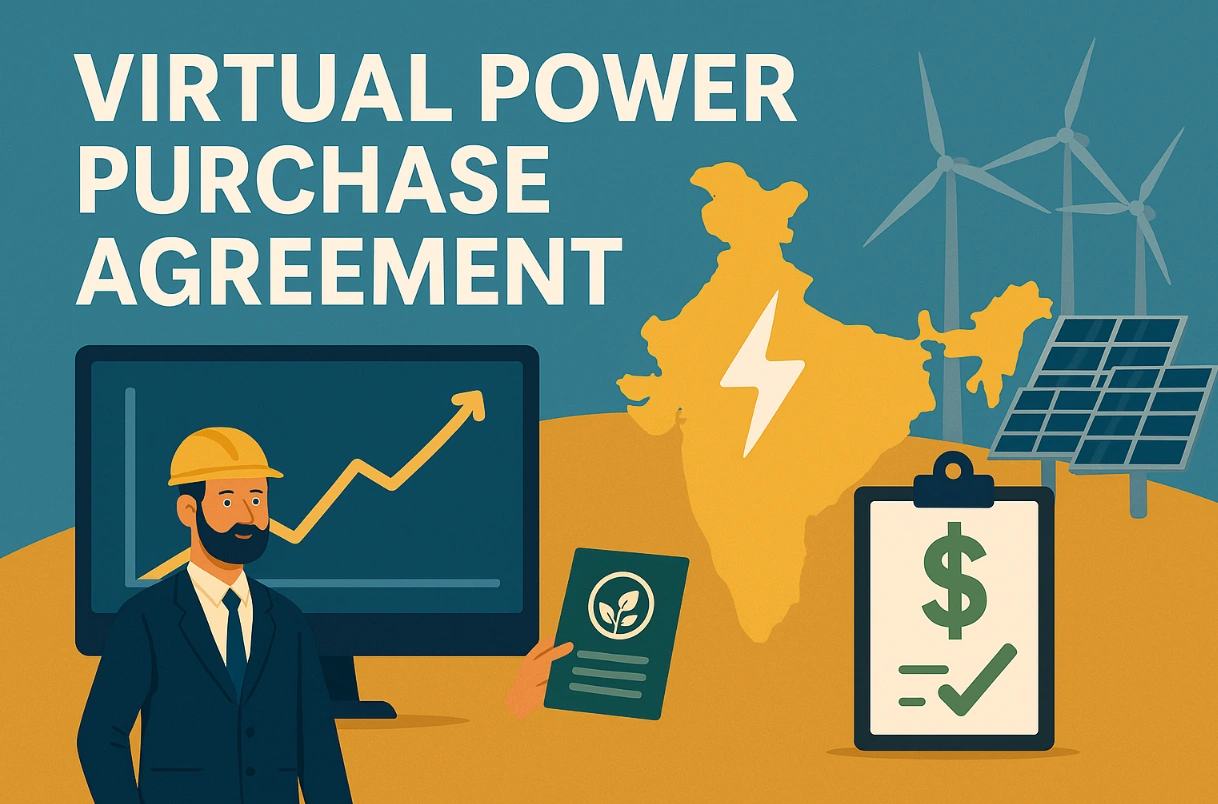Solid Waste Management in India: Policy Shifts, Tech Trends, and Investment Opportunities

By – Sakya Singha Chaudhuri, Sangeeth Narayanan and Chumthunglo Nguille
Table of Contents
Introduction
Solid waste refers to the variety of waste materials discarded as unwanted and useless as a result of industrial, residential and commercial activities. Traditionally dumping waste in landfills has been the standard approach for solid waste management. However, this is far from the ideal as it results in pollution, stench and ground water contamination.
With the growing volume of waste, solid waste management has become a critical environmental and public health concern globally. Rapid urbanization, population growth, construction and wide spread industrialization have led to increased waste generation, posing serious challenges to sustainable and safe disposal of waste disposal and resource recovery.
According to the World Bank, global waste generation is expected to reach 3.4 billion tons by 2050, up from 2.01 billion tons in 20161. Further, as per the Annual Report of Central Pollution Control Board for the year 2021-2022, the average quantity of solid waste generated in India is 1,70,338 metric tons per day2. Managing this surge efficiently is essential for maintaining ecological balance and mitigating climate change.
Solid waste management encompasses all processes involved in handling solid waste from collection to final disposal, with the aim of minimizing its negative impact on the environment and public health.
Recent advancements in technology, policy reforms, and public awareness campaigns have introduced new trends and created fresh opportunities in this sector. This article explores the latest developments and emerging opportunities in solid waste management.
Legal and Policy Reforms for Solid Waste Management in India
Solid Waste Management Rules, 2016
Recognizing the importance of solid waste management and the need for a comprehensive framework, the Government of India introduced the Solid Waste Management Rules, 2016 to ensure effective waste management through proper segregation, collection, transportation, and disposal.
Applicability and Coverage
The Solid Waste Management Rules have a broad scope, covering various geographical areas and entities. They apply to urban local bodies, outgrowths in urban agglomerations, census towns, notified areas, industrial townships, and even institutions like airports, railway stations, ports, and SEZs.
Additionally, every domestic, institutional, commercial, and non-residential solid waste generator is covered under the Solid Waste Management Rules. The rules categorize waste generators into different groups, including:
- Households
- Event organizers
- Street vendors
- Resident Welfare Associations (RWAs)
- Market associations
- Gated communities with an area exceeding 5000 sq.m.
- Hotels and restaurants
Each of these entities is required to segregate their waste into biodegradable, non-biodegradable, and domestic hazardous waste, ensuring it is handed over to authorized waste collectors.
Duties of Authorities:
Local authorities and other stakeholders are mandated to ensure proper waste management. Their responsibilities include:
- Establishing waste processing facilities
- Encouraging waste segregation
- Promoting recycling
Waste-to-energy plants are encouraged for waste with a calorific value of 1500 Kcal/kg or above, facilitating effective energy recovery.
National Clean Air Programme (NCAP) and Circular Economy
The National Clean Air Programme emphasizes solid waste management as a key strategy for reducing air pollution. Action plans have been devised at the national, state, and city levels, addressing emissions from waste management activities.
The national level plan includes the action plans, schemes/ programmes of 07 line ministries (MoP, MoRTH, MoHUA, MNRE, MHI, MoAFW & MoPNG) and all 24 States/UTs.
City action plans have been worked out for 130 cities to address air pollution in various sectors including:
- Vehicular emissions
- Road dust
- Construction
- Solid waste management
- Industrial pollution
Circular Economy Action Plans for ten waste categories have been finalized and are under implementation to promote sustainable waste management practices. These categories include:
- Lithium-ion batteries
- E-waste
- Toxic and hazardous industrial waste
- Scrap metal
- Tyres and rubber
- End-of-life vehicles
- Gypsum
- Used oil
- Solar panels
- Municipal solid waste
These are under implementation to promote sustainable waste management practices.
Recent Trends in Solid Waste Management
Recent trends in solid waste management space reflects an increased focus on adoption of various measures for efficient solid waste management practice. Some of the notable global trends prevalent in this sector are as follows:
Waste-to-Energy (WTE) Technologies:
Waste-to-energy is gaining momentum as an alternative to traditional landfill disposal. Methods such as incineration, pyrolysis, gasification, and anaerobic digestion convert solid waste into electricity, heat, or fuel.
Countries like Sweden and Japan lead in WTE adoption, with Sweden converting almost 99% of its waste into energy3. Waste-to-Energy plants are being set up across various Indian cities for efficient recovery of energy while disposing of solid waste.
Smart Waste Management Systems:
The integration of IoT (Internet of Things) and AI (Artificial Intelligence) in waste management has improved efficiency. Smart bins equipped with sensors optimize collection routes by notifying authorities when they are full, reducing fuel consumption and operational costs.
Cities like Singapore and Barcelona have successfully implemented smart waste solutions.
Circular Economy and Recycling Innovations:
The circular economy focuses on the “3 REs”: Reduce, Reuse, and Recycle. Shifting from a linear (produce-use-dispose) to a circular model (reduce-reuse-recycle) is influencing waste policies worldwide.
Governments and businesses are focusing on extended producer responsibility (EPR) programs, which make manufacturers accountable for their product’s end-of-life disposal.
Recycling innovations include chemical recycling for plastics, where plastic waste is broken down into raw materials for new products. The Plastic Waste Management Rules, 2016 is another thrust on plastic waste management, focusing on source segregation, recycling and involving various agencies like waste pickers, recyclers and waste processors for collection of plastic waste from households or any other source of its generation.
Decentralized Waste Processing:
Decentralized composting, biogas plants, and small-scale waste-to-energy units allow urban areas to manage waste efficiently reducing dependency on large landfills.
Indore has been recognized for its success in solid waste management, by implementing decentralized waste segregation and composting at community levels.
Public-Private Partnerships (PPPs):
Many municipalities and local bodies are leveraging public-private partnerships to enhance solid waste management infrastructure. Private firms bring innovation, efficiency, and capital investment, while governments ensure regulatory compliance and community engagement.
The Swachh Bharat Mission (Clean India Campaign) in India is a key example of PPP-driven waste management success.
Opportunities in Solid Waste Management
Despite the challenges being faced in efficient SWM practices, there are numerous opportunities having enormous potential to improve and benefit from efficient solid waste management practices:
Investment in Waste-to-Energy Projects
With rising energy demands and landfill shortages, waste-to-energy plants are an attractive business model. As per data provided by the Ministry of New and Renewable Energy, the total estimated energy generation potential from various sources of solid waste in India is approximately 3190 MW4 presenting lucrative investment opportunities.
However, the regulatory challenges in terms of environmental compliance, power tariff, guaranteed power procurement from WTE plants are some of the challenges.
Advanced Recycling Technologies
With an average of 16% of solid waste being recycled, the need for advanced recycling techniques is immense. Innovations such as enzyme-based plastic recycling and blockchain for waste tracking open new doors for investors and entrepreneurs.
Bio-composting and Organic Waste Processing
About 50% of municipal solid waste is organic, making composting a viable business opportunity. Startups and local businesses can tap into compost production, benefiting agriculture and urban farming initiatives. There is an emerging trend of setting up of Bio-CNG plants across cities for disposal of organic waste.
E-Waste Management
With growing electronic consumption, there is an urgent need for responsible disposal and metal recovery from discarded gadgets. The management of e-waste is being carried out under the frame work of E-Waste (Management) Rules, 2016 introducing Extended Producer Responsibility (EPR) regime for e-waste recycling.
The Rules are applicable to every manufacturer, producer, consumer, bulk consumer, collection centres, dealers, e-retailer, refurbisher, dismantler and recycler. All producers of notified electrical and electronic equipment have been given annual E-Waste collection targets based on the generation from the previously sold equipment.
All manufacturers, producers, refurbishers and recyclers are required to register on portal developed by Central Pollution Control Board to ensure effective monitoring.
Sustainable Packaging Solutions
As countries enforce bans on single-use plastics, businesses specializing in biodegradable and compostable packaging have a growing market. Companies investing in alternative materials like mycelium-based packaging and edible cutlery are seeing rising demand.
Conclusion
Solid waste management is at a turning point, with the rise in waste generation demanding immediate and effective action. Technological innovations in WTE, smart systems, and policy-level shifts offer hope for a more sustainable future.
By addressing root causes, adopting new technologies, and raising public awareness, authorities can tackle the challenges posed by rising waste.
Moreover, the sector offers a wealth of investment and entrepreneurial opportunities — from recycling innovations and decentralized processing to e-waste and sustainable packaging.
By embracing a circular economy and leveraging technology, solid waste can be transformed from a pressing problem into an environmental and economic solution.
FAQs
-
What are the harmful effects of solid waste?
Solid waste leads to pollution, foul odours, and groundwater contamination, posing serious risks to environmental and public health. Improper disposal contributes to air pollution, ecological imbalance, and accelerates climate change – especially in rapidly urbanizing regions.
-
How to reduce solid waste?
Solid waste can be minimized through the principles of a circular economy -reduce, reuse, and recycle. Key strategies include source segregation, sustainable packaging, composting, and promoting recycling practices at individual and institutional levels.
-
Why is Solid Waste Management important?
Solid waste management is vital to prevent environmental degradation, protect public health, and support sustainable urban living. It also plays a crucial role in climate change mitigation by reducing pollution and enabling resource recovery.
-
What are the responsibilities of waste generators under the SWM Rules?
Under the Solid Waste Management Rules, 2016, waste generators must segregate waste into biodegradable, non-biodegradable, and domestic hazardous categories and ensure proper handover to authorized waste collectors for disposal.
-
What is decentralized waste processing, and why is it important?
Decentralized waste processing involves treating waste at or near its source through composting, biogas generation, and small-scale energy units. It reduces reliance on landfills, lowers transportation costs, and encourages local community participation.
-
What are the investment opportunities in the waste management sector?
Waste-to-energy (WTE) plants present a major investment opportunity, with India’s estimated solid waste-based energy potential reaching 3,190 MW. The sector offers strong prospects for private and institutional investors amid growing energy demands and landfill constraints.
-
How can businesses benefit from sustainable packaging solutions?
Businesses investing in alternatives like mycelium-based packaging and edible cutlery tap into a growing eco-conscious market. Sustainable packaging enhances brand reputation, attracts green-minded consumers, and aligns companies with global environmental standards.
-
What role does recycling play in modern waste management?
Recycling is central to modern waste management, enabling landfill reduction, pollution control, resource recovery, and economic opportunities. Advanced technologies such as chemical recycling and blockchain tracking are enhancing recycling efficiency and transparency.
-
How does e-waste management contribute to environmental sustainability?
E-waste management under the E-Waste (Management) Rules, 2016, and the Extended Producer Responsibility (EPR) framework ensures safe recycling and disposal of electronic waste. It prevents hazardous substances like lead and mercury from polluting the environment and safeguards human health.
-
What is bio-composting, and how can it benefit urban areas?
Bio-composting converts organic waste into nutrient-rich compost through natural decomposition. It reduces landfill burden, supports urban farming, and opens business opportunities for startups and local enterprises in sustainable waste processing.
-
What steps can individuals take to support better waste management practices?
Individuals can contribute by segregating waste at home, using recycled products, supporting eco-conscious businesses, and spreading awareness on sustainable practices. Responsible citizen action plays a key role in effective waste management systems.
References
- World Bank, “What a Waste 2.0”, 2018
- https://pib.gov.in/PressReleaseIframePage.aspx?PRID=2003989
- https://studentenergy.org/conversion/waste-to-energy/#:~:text=Waste%20to%20Energy?-,Waste%20to%20Energy%20(WTE)%2C%20is%20a%20term%20that%20is,and%20landfill%20gas%20recovery%201.
- https://mnre.gov.in/en/waste-to-energy-overview/


